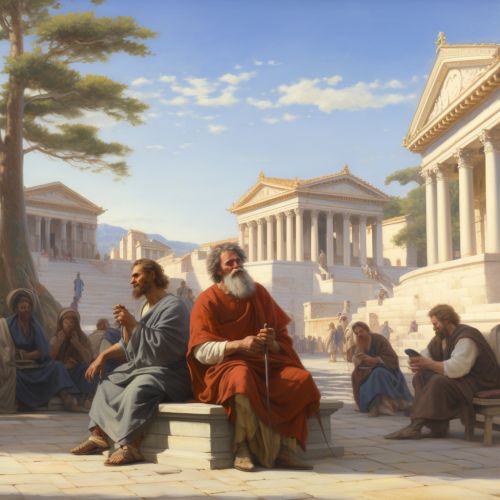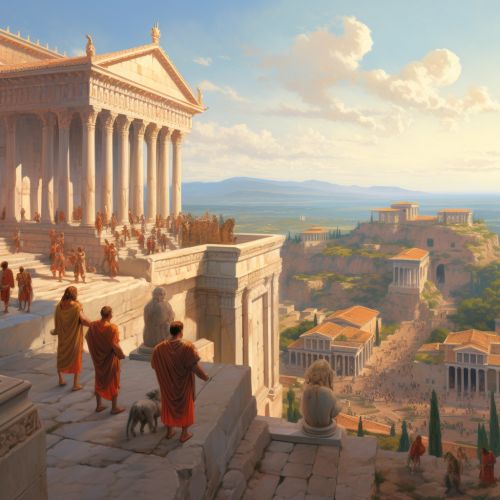Ancient philosophy
Pre-Socratic Philosophy


The term "Pre-Socratic" refers to the philosophers who lived and taught before Socrates. This period saw the development of a fundamental shift in human thought, as individuals began to question and challenge the traditional religious explanations of the world and instead sought naturalistic explanations.
Milesian School
The Milesian School, founded in the 6th century BCE in Miletus, an ancient Greek city, was the first to attempt to explain the world in terms of matter and change. The school's main figures were Thales, Anaximander, and Anaximenes, who each proposed different primordial substances from which everything else is derived: water, the boundless, and air, respectively.
Pythagoreanism
Pythagoras is often considered the first pure mathematician. His philosophy, Pythagoreanism, held that all things are numbers, and thus the realities of the world can be understood through numerical relationships. Pythagoreanism also introduced the concept of the immortal soul and the theory of musical harmony.
Heraclitus
Heraclitus proposed that the fundamental nature of the universe is change, famously stating that "one cannot step into the same river twice." His philosophy, often described as "flux theory," emphasized the transitory and chaotic nature of existence.
Parmenides and Zeno
Parmenides and his student Zeno of Elea challenged the concept of change. Parmenides argued that reality is unchanging and indivisible, while Zeno's paradoxes aimed to show that motion and plurality are illusions.
Classical Greek Philosophy


Classical Greek philosophy is typically divided into the Socratic period and the post-Socratic period. The Socratic period is defined by the work of Socrates and his students, while the post-Socratic period is marked by the development of systematic philosophy.
Socratic Philosophy
Socrates, unlike his predecessors, focused not on the natural world, but on ethics and human behavior. He is known for the Socratic method, a form of inquiry used to stimulate critical thinking and to expose the contradictions in one's beliefs.
Platonic Philosophy
Plato, a student of Socrates, founded the Academy in Athens, the first institution of higher learning in the Western world. His dialogues cover a wide range of topics, including politics, aesthetics, and metaphysics. His theory of forms posits a world of ideal forms that exist beyond the material world and are more real than the objects we perceive.
Aristotelian Philosophy
Aristotle, a student of Plato, founded the Lyceum and developed a comprehensive system of philosophy to explain the natural, the human, and the divine. His works cover a wide range of topics, including logic, biology, ethics, and politics. His logic, particularly the theory of syllogism, was the dominant form of logic until the 19th century.
Hellenistic Philosophy


The Hellenistic period, following the death of Alexander the Great, saw the spread of Greek culture across the Mediterranean and the Middle East. This period was marked by the development of several influential schools of thought.
Cynicism
The Cynics rejected conventional notions of happiness and advocated for a life in accordance with nature, free from societal norms and expectations. The most famous Cynic, Diogenes of Sinope, is said to have lived in a large ceramic jar in Athens.
Epicureanism
Epicurus founded the school of Epicureanism, which taught that the purpose of life is to attain a state of tranquility and freedom from fear, achieved through knowledge, friendship, and the avoidance of unnecessary desires.
Stoicism
Stoicism, founded by Zeno of Citium, taught that virtue is the only good and that one should strive to maintain equanimity in the face of life's ups and downs. The Stoics believed that everything is material, including the soul, and that the universe is guided by a divine rational principle.
Skepticism
The Skeptics questioned the possibility of certainty in knowledge. They argued that one should suspend judgment on all matters, as any belief could be contradicted by a different perspective or new evidence.
